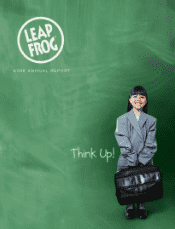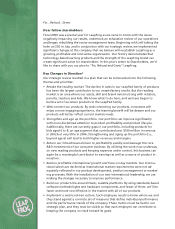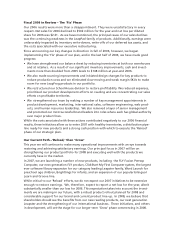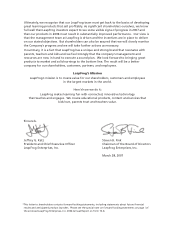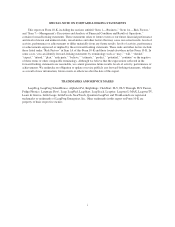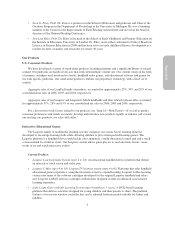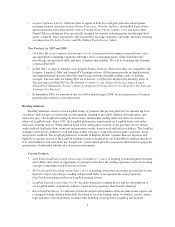LeapFrog 2006 Annual Report Download - page 10
Download and view the complete annual report
Please find page 10 of the 2006 LeapFrog annual report below. You can navigate through the pages in the report by either clicking on the pages listed below, or by using the keyword search tool below to find specific information within the annual report.
•Scott G. Paris, Ph.D. Dr. Paris is a professor in the School of Education and professor and Chair of the
Graduate Program in the Department of Psychology at the University of Michigan. He was a founding
member of the Center for the Improvement of Early Reading Achievement and served on the board of
directors of the National Reading Conference.
•Jeni Leta Riley, Ph.D. Dr. Riley is the head of the School of Early Childhood and Primary Education for
the Institute of Education, University of London. Dr. Riley received her conferment of title of Reader in
Literacy in Primary Education in 2000 and has been active in early childhood literacy development as a
teacher, lecturer, examiner and researcher for nearly 30 years.
Our Products
U.S. Consumer Products
We have developed a variety of stand-alone products, learning platforms and a significant library of related
content. Our platforms are hardware devices that work with multiple content sets. Our content comes in the form
of memory cartridges used in interactive books, handheld video games, and educational software and games for
use with specific platforms. Our stand-alone products combine our proprietary technology with a fixed set of
content.
Aggregate sales of our LeapPad family of products, accounted for approximately 23%, 35% and 20% of our
consolidated net sales in 2006, 2005, and 2004, respectively.
Aggregate sales of our Leapster and Leapster L-MAX handhelds and their related software titles accounted
for approximately 37%, 28% and 19% of our consolidated net sales in 2006, 2005 and 2004, respectively.
For a discussion of risk factors related to our products, see “Item 1A—Risk Factors—If we fail to predict
consumer preferences and trends accurately, develop and introduce new products rapidly or enhance and extend
our existing core products, our sales will suffer.”
Interactive Educational Games
The Leapster family of multimedia learning systems comprises our screen-based, learning initiative
developed to encourage learning skills while allowing children to play action-packed learning games. The
Leapster platform is a handheld device with backlit color animation, a multi-directional control pad and a touch-
screen enabled by a built-in stylus. Our Leapster content allows game players to read electronic books, create
works of art and watch interactive videos.
Current Products
•Leapster Learning Game System (ages 4 to 10). An educational handheld device platform that utilizes
an interactive touch screen and stylus pen.
•Leapster L-Max (ages 4 to 10); LeapsterTV learning system (ages 4 to 8). Platforms that offer handheld
educational games experience, using the television screen to expand learning. Leapster L-Max learning
system uses many of the software cartridges developed for the original Leapster handheld and offers
new Leapster L-MAX software cartridges with features designed to offer an enhanced screen-based
learning experience.
•Little Leaps Grow-with-Me Learning System (ages 9 months to 3 years). A DVD-based learning
platform that delivers activities designed for young children and their parents to share. The platform
features a two-in-one wireless controller that can be adjusted between models suitable for babies and
toddlers.
3

